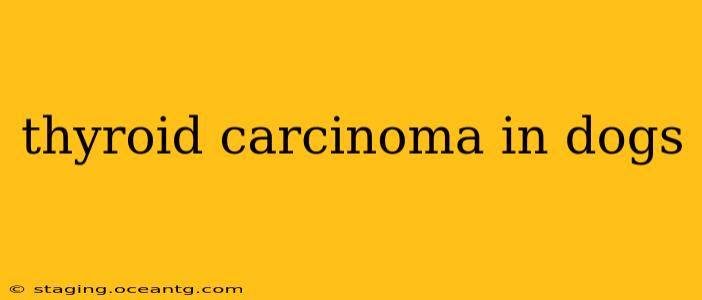Thyroid carcinoma, a cancer of the thyroid gland, is a relatively uncommon but serious disease affecting dogs. Understanding its causes, symptoms, diagnosis, and treatment is crucial for pet owners to provide the best possible care for their canine companions. This comprehensive guide will delve into the intricacies of canine thyroid carcinoma, answering frequently asked questions and providing valuable insights into this complex condition.
What is Thyroid Carcinoma in Dogs?
Thyroid carcinoma is the malignant (cancerous) growth of cells within the thyroid gland, located in the neck. This gland produces hormones vital for regulating metabolism, growth, and development. In dogs, the most common type is papillary carcinoma, although follicular and anaplastic carcinomas can also occur. These different types vary in their aggressiveness and prognosis. Unlike in humans where thyroid cancer is often associated with iodine deficiency, the exact causes in dogs remain largely unclear, but factors like genetics and exposure to certain environmental toxins are suspected.
What are the Symptoms of Thyroid Carcinoma in Dogs?
The symptoms of thyroid carcinoma in dogs can be subtle and often go unnoticed in the early stages. This makes early detection challenging. Some common signs include:
- A palpable lump or swelling in the neck: This is often the first noticeable symptom, and it can vary in size and consistency.
- Difficulty breathing or swallowing: A large tumor can compress the trachea (windpipe) or esophagus, leading to respiratory distress or difficulty swallowing.
- Changes in vocalization: A hoarse bark or change in vocalization can be indicative of tracheal compression.
- Weight loss: Despite a normal appetite, weight loss can occur due to metabolic changes or difficulty eating.
- Lethargy and weakness: The dog may exhibit general fatigue and lack of energy.
- Increased thirst and urination (polydipsia/polyuria): This can be a symptom of hormonal imbalances related to the tumor.
- Neurological signs (in advanced cases): In advanced stages, the tumor may press on nerves in the neck, leading to neurological issues.
How is Thyroid Carcinoma Diagnosed in Dogs?
Diagnosing thyroid carcinoma requires a multi-step approach involving a thorough physical examination, imaging studies, and potentially fine needle aspiration (FNA) biopsy.
- Physical Examination: Your veterinarian will perform a comprehensive physical exam, paying close attention to the neck area to palpate any lumps or masses.
- Ultrasound: Ultrasound imaging can visualize the thyroid gland and surrounding structures, helping determine the size and location of the tumor.
- Fine Needle Aspiration (FNA) Biopsy: This minimally invasive procedure involves inserting a fine needle into the mass to collect cells for microscopic examination by a pathologist. This helps determine if the growth is cancerous and, if so, the type of carcinoma.
- Blood Tests: Blood tests can measure thyroid hormone levels, although these tests are not definitive for diagnosing thyroid carcinoma. They can, however, reveal whether the thyroid gland is functioning properly.
- Chest X-rays and other imaging: Chest x-rays may be done to check for metastasis (spread of cancer to other parts of the body), particularly to the lungs.
What are the Treatment Options for Thyroid Carcinoma in Dogs?
Treatment options for canine thyroid carcinoma depend on several factors, including the type of cancer, the size and location of the tumor, and the overall health of the dog. Common treatments include:
- Surgery: Surgical removal of the thyroid tumor is often the primary treatment option. The extent of surgery depends on the size and location of the tumor.
- Radioactive Iodine Therapy (RAI): This advanced treatment may be used in conjunction with surgery or in cases where surgery is not feasible. RAI targets and destroys cancerous thyroid cells.
- Chemotherapy and Radiation Therapy: These treatments are less commonly used for canine thyroid carcinoma, but may be considered in specific cases, depending on the type and stage of cancer.
What is the Prognosis for Dogs with Thyroid Carcinoma?
The prognosis for dogs with thyroid carcinoma varies greatly depending on several factors, including the type of cancer, the stage of the disease at diagnosis, and the response to treatment. Early diagnosis and prompt treatment significantly improve the chances of a favorable outcome.
Can Thyroid Carcinoma in Dogs be Prevented?
There's currently no definitive way to prevent thyroid carcinoma in dogs. However, maintaining a healthy lifestyle for your dog, including a balanced diet and regular veterinary checkups, can help detect any abnormalities early.
What is the cost of treating Thyroid Carcinoma in Dogs?
The cost of treating canine thyroid carcinoma can vary greatly depending on the chosen treatment method, the severity of the disease, and the location of your veterinary clinic. Surgery, imaging, and specialized treatments such as RAI can be expensive. It's best to discuss the anticipated costs with your veterinarian early in the treatment planning process.
This information is for educational purposes only and should not be considered medical advice. Always consult with a veterinarian for accurate diagnosis and treatment of your dog's health concerns. Early detection and prompt veterinary care are essential for managing thyroid carcinoma in dogs.
